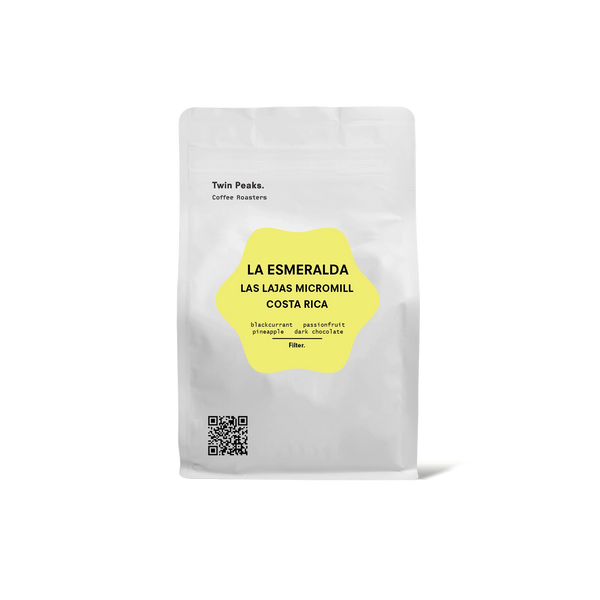
La Esmeralda | Costa Rica | Filter
In stock
We Nitrogen Flush all of our coffee when bagging for an inert shelf stable environment by locking freshness inside for up to 6 weeks prior to opening
Region: Sabanilla de Alajuela, Central Valley
Varietal: Catuai, Caturra
Process: Alma Negra | Natural
Altitude: 1400–1600 MASL
Oscar and Francisca Chacón are third-generation coffee producers, but the coffee is more than just in their family heritage: It's in their hearts and souls as well. The couple is committed to quality and innovation, and are among the very first farmers in Costa Rica to produce Honey and Natural process specialty coffee.
In 2005, after years of delivering their cherry to a cooperative for the going market price, they decided to join the brand-new "micromill revolution" and buy their own depulper to have more control over the quality and the price they received for their lots. "At first, we didn't know what we were doing," Oscar explains. "We were just experimenting." That experimentation led to some of the most exciting new flavor profiles we have ever tasted: Now, the Chacons produce a wide range of Honey process coffees, modulating the drying time in order to create different effects in the cup.
Necessity bred more innovation for the family when an earthquake in 2008 wiped out electricity and water to their area during the harvest. Unable to run the depulpers or to wash the mucilage off to produce Washed lots, Francisca took inspiration from her knowledge of African coffee production and quickly built raised beds on the property. Their Natural lots caught the attention of Cafe Imports' founder Andrew Miller, and the rest is both history and our-story.
Las Lajas owns and the following farms for cultivating their coffees: Calle Liles, Calle San Juan, Los Angeles, Los Pinitos, Sabana Redonda, Sabanilla, San Luis, Calle Lajas.
| Alma Negra | It is a natural process, where the coffee fruit are first classified to obtain those 100% ripe cherries with a high level of brix degrees. Later they are placed on a raised bed for their dehydration process for at least a week, where they will be removing several times a day. After a week has passed, the cherries are transferred to the greenhouse patio, where during the day they are kept in a thin layer to absorb the heat of the sun and during the night they are collected in the form of a mound. This same process is repeated the next day until drying is complete. | From 20 to 30 days | 60 days or until exportation |























